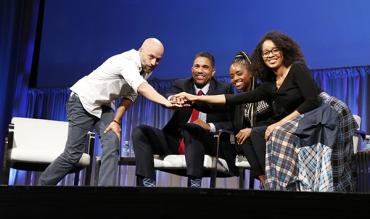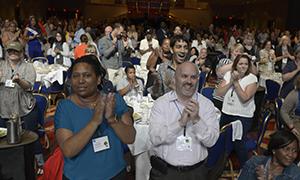A powerful commitment to collaboration and social justice closed out the TEACH conference Saturday afternoon, making it clear that the AFT is part of a larger movement that amplifies the work we do and reaches far more people than we could ever reach alone—and vice versa.
Panelists from the Women's March on Washington, Chicago's Grassroots Education Movement, and the ABC Community School Partnership in Albuquerque/Bernalillo County, N.M., joined talk show host Pete Dominick, who mediated a rich discussion of the power of collaboration at the local and national levels.
In the current political climate, which is "everything that we don't want," said Tamika Mallory, co-chair of the Women's March, there have been both steps forward and steps back. Back, because of the destructive policies and culture pushed by the presidential administration, but forward, because of the activism and unity those have engendered.
"People are starting to work together," said Mallory. But she did admit that when organizing for the Women's March began, some activists were not ready to embrace all the issues under its umbrella—they were focused primarily on choice and women's equity, but uncomfortable with more "radical" agendas. They also thought the resistance began with Trump, when many people felt that "No, no, no, Trump is the grandson and great-grandson and nephew of 'isms' that have existed in this country forever," she said. But over time, she said, "We've been able to get people to pay attention to intersectionality."
In Chicago, the movement has also evolved, said Johnaé Strong, coordinator of the Grassroots Education Movement there. "We have this long arc of generational, systemic injustice, systemic disinvestment from communities, but we also have solidarity and resistance, brilliance and creativity," she said. She is inspired by the way different advocacy organizations have been coming together, joining forces for solidarity marches. Initially, there were conflicting views presented, sometimes from the same stage, but pre-event collaboration is increasing, and the messaging is becoming clearer and more intersectional.
José Muñoz, executive director of the ABC Community School Partnership in New Mexico, sees that sort of collaboration in community schools that open up their doors to families in their neighborhoods, breaking down social barriers and creating ties between education and community while at the same time creating economic and workforce development. "When you have that on-the-ground organizer creating a bridge between the school and community," he said, "You see some great innovative programs come out of that."
Strong also underscored the importance of small-scale activism. "Sometimes we go so macro, and we look at the behemoth and think we have to have this 30-page intellectualized approach, but there are some indigenous ways we know how to relate to each other," she said. And she lifted up the partnership that resonated most with the AFT audience: The Chicago Teachers Union is working closely with the community to write into their contract a requirement for more community schools in the city. Community members will actually help bargain that provision.
"It's a really beautiful example of collaboration."
[Virginia Myers]


